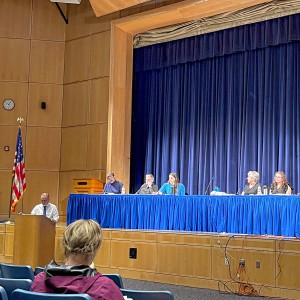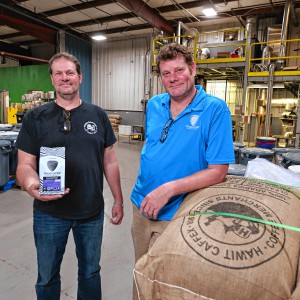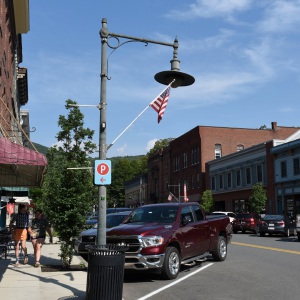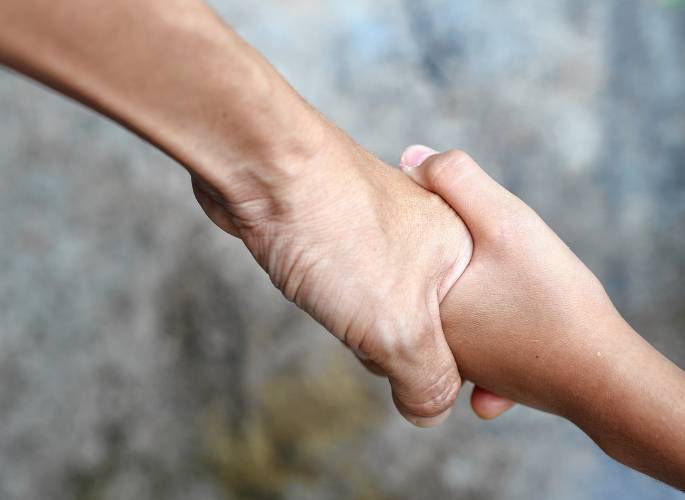My Turn: What can I do?
| Published: 12-03-2023 8:41 AM |
Picture an intersection in East Springfield. Never mind the East Springfield part, any intersection will do. Picture a small, older woman behind the wheel of a modest sedan. You don’t know this, but she is driving to her son’s apartment. She doesn’t like driving anymore but she goes, two or three times each week.
Her son is disabled and needs help. She takes him to medical appointments, gets supplies, cleans and makes a large pot of her special rice with those tiny pinto beans meant to last the week. She wishes it was easier to park on his street and that it was not so hilly, but she goes anyway. Maybe she’s thinking about where she’ll park as the light turns green and she heads through the intersection.
BAM! A shuddering jolt. She’s hit. Of course, she’s wearing a seat belt; luckily, the seat adjusts for her particular height and the seat belt fits properly. Most lucky, she’s OK, stunned but unhurt. The front car door is badly dented and caved in, but she’s able to drive over to the curb.
The vehicle that hit her car, a truck, also drives to the side of the road and stops. The driver is a young guy who storms out of his car full of adrenalin and attitude. “You didn’t have the light,” he shouts. He shouts in her face, towering over her, using his size and his voice to intimidate. She might seem easy to intimidate if you don’t know any better. He doesn’t. Meanwhile, a man comes out of his store and approaches.
“Are you all right?” he asks, with a courteous concern. “Don’t worry,” he tells her. “That’s my store,” he says, pointing to the nearby corner. I saw everything; it’s on camera. And it was your light.”
Then a third person parks her car and approaches, ignoring the truck’s driver, attending to the woman who was hit. “I was behind you. I saw what happened.” She speaks directly to the man, “Your light was red.” She reaches over to clasp the woman’s hand.
“I’m all right now,” our woman replies. Meaning I’m all right but not everything is all right. She’s still shaken as she faces her accuser, “I had the light.” She knows what she knows. The guy slumps. He’s losing wind fast.
In the next half-hour, more people show up. The woman is joined by her daughter. The good Samaritan lady from the car behind knows the daughter because they are both local lawyers. And soon enough their numbers are increased even more as a number of local cops appear. Two of them, it turns out, are the woman’s nephews.
Article continues after...
Yesterday's Most Read Articles
 Bridge of Flowers in Shelburne Falls to open on plant sale day, May 11
Bridge of Flowers in Shelburne Falls to open on plant sale day, May 11
 As I See It: Between Israel and Palestine: Which side should we be on, and why?
As I See It: Between Israel and Palestine: Which side should we be on, and why?
 $12.14M school budget draws discussion at Montague Town Meeting
$12.14M school budget draws discussion at Montague Town Meeting
 Greenfield homicide victim to be memorialized in Pittsfield
Greenfield homicide victim to be memorialized in Pittsfield
 Fogbuster Coffee Works, formerly Pierce Brothers, celebrating 30 years in business
Fogbuster Coffee Works, formerly Pierce Brothers, celebrating 30 years in business
 Streetlight decision comes to Shelburne Town Meeting
Streetlight decision comes to Shelburne Town Meeting
And by then the belligerent driver, the guy with his attitude, what’s he doing? He’s crying. His head is on the shoulder of the woman driver, who pats his head and reassures him. “It was an accident,” she says, her voice soft and kind.
“I’m so sorry,” he cries.
Her daughter will drive her mother home. Someone else will make sure the damaged car gets home, too. The accident will be properly written up and reported. The car, its front door battered in, sits in the driveway days later. No one seems in a hurry to get it assessed or repaired. But a few days later, the woman will drive someone else’s car to her son’s house.
“I am more afraid to drive now,” she says. “But what can I do?”
For my friend, “what can I do” is a statement of heroic obligation. We too may do those many things to help our families, our friends, even our extended communities, some of whom we know, some we don’t, but we know there is a need. The phrase, “what can I do” is, after all, not really a question but a self-direction, a value that implies we show up.
The same phrase also may be expressed as a kind of sigh, composed of our many worries about this — our broken world. It calls forth my own grandmother’s old country, deep-chested sounding that contained a heart-world of resignation and loss.
“What can I do,” Grandma cried, wringing her hands, looking after the dubious ill-manners of a world still full of sorrows. And like my grandmother, I too, and maybe you as well, utter woeful sighs from time to time and yet we have to keep on doing, because what else can we do?
Ruth Charney lives in Greenfield.



 Guest columnist Gene Stamell: We know what we know
Guest columnist Gene Stamell: We know what we know Michelle Caruso: Questions candidate’s judgment after 1980s police training incident
Michelle Caruso: Questions candidate’s judgment after 1980s police training incident Kathy Sylvester: Vote for expertise on May 6
Kathy Sylvester: Vote for expertise on May 6 Shirley and Mike Majewski: Vote for Blake Gilmore
Shirley and Mike Majewski: Vote for Blake Gilmore
